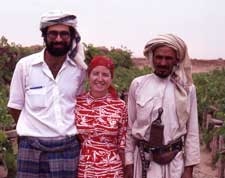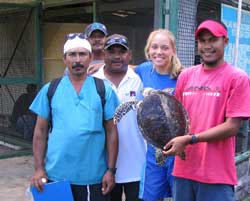 KINGSTON, R.I. — June 6, 2006 — University of Rhode Island 2005 alumna Rachel LoMonaco spent two weeks in Guinea before she got the chance to e-mail her former French classmates about life as a Peace Corps volunteer. She appeared to be adjusting rapidly to life with hit-and-miss electricity and without running water. “I sweat more than I ever sweat in my life,” the French and textiles, fashion merchandising and design double- major confided. “But bucket baths are refreshing.”
KINGSTON, R.I. — June 6, 2006 — University of Rhode Island 2005 alumna Rachel LoMonaco spent two weeks in Guinea before she got the chance to e-mail her former French classmates about life as a Peace Corps volunteer. She appeared to be adjusting rapidly to life with hit-and-miss electricity and without running water. “I sweat more than I ever sweat in my life,” the French and textiles, fashion merchandising and design double- major confided. “But bucket baths are refreshing.”
LoMonaco is among 13 URI alumni currently serving in the Peace Corps, which celebrates its 45th birthday this year. The program traces its roots to President John F. Kennedy who challenged young Americans to serve their country in the cause of peace by living and working in developing countries. Since then, more than 182,000 volunteers, including 340 URI graduates, have been posted to 75 countries around the world. Last year, the number of Corps volunteers whose average age is 28, up from 24 when the program began, hit a 30-year high.
Anne Atkins Stulik and her husband Ed Stulik of Barrington, both URI 1976 graduates were newlyweds when they joined the corps in 1978 and spent two years in Yemen. 
“I wouldn’t trade the experience for anything in the world,” says Anne who put her nursing degree to immediate use, first working in a Yemeni emergency room and then as a midwife. Today, the mother of two teenage girls is a nurse practitioner who works part-time at Women & Infants’ Hospital. “I often draw on my Peace Corps experience. For example, I have a fair number of Arab patients who need to be shown more sensitivity, especially since 9/11. I also work in a multicultural clinic.”
Ed, whose degree was in zoology, worked at a hospital run by British doctors in Saada where he ran two clinics vaccinating children against such childhood diseases as measles, mumps, and tetanus. His biggest challenge was convincing parents to get their
children vaccinated. Since the vaccines often made the kids ill because they were in poor health, many parents didn’t want to bring them back for a second dosage because they didn’t understand how the vaccines could help.
Ed worked alongside Sudanese volunteers who helped him with Arabic while he helped teach them English. “We felt a sense of camaraderie despite differences in culture, color, and languages.”
The experience not only influenced Ed’s life but his career choice. Today, he is an internist and a clinical assistant professor at Brown University.
“We’ll always remember the Yemeni spirit of hospitality,” Anne says, recalling once being offered a TV set, which would run off a car battery. Ed couldn’t set up a tent without the local residents rushing out to offer the couple a bedroom inside their homes. “No matter where I was, residents would offer me tea, food, and social company,” he recalls.
Anne and Ed have counseled returning volunteers who often experience a reverse culture shock. “You expect things to be different when you volunteer in another country, but you don’t realize how much you have changed until you return home, “ Anne says. “For example, shortly after I came home I remember a friend worrying about what dress she was going to wear, while I was recalling a dying baby I held in my arms.”
“We try to live simply,” Anne says of their the couple’s own adjustment. “We don’t always succeed, but we try.”
Like the Stuliks, F. Noel Perry served two years in Yemen, although the URI graduates never met on campus or in the Arab country. The Peace Corps is kind of a Perry family legacy. When Noel was young, his father was asked to complete a Corps personnel evaluation in Washington, D.C.
Perry, a 1974 political science graduate, helped bring drinking water to the center of four villages. “It was a great experience,” says the San Francisco Bay area businessman. “It gave me a chance to take part in a different culture and make a contribution.” After service in Yemen, Perry worked for a year at Peace Corps Headquarters in the nation’s capital. “I’m convinced that the only way to peace will come through intercultural exchanges where similarities and understandings are shared,” he says.
Danielle Morley of Wakefield, a 2001 URI alumna planned on joining the Peace Corps since she was a child. “What idealistic person doesn’t dream of saving the world on a grassroots level?” the marine biologist asks. Morley served in the Republic of Palau, an independent island nation near the Philippines from 2003 to 2005. 
She worked on monitoring programs for Ngaremeduu Bay Conservation Area, the largest marine protected area in the Micronesian region. She also developed environmental education programs for local schoolchildren and helped train community members in monitoring sea grass, sea turtle and crocodile tagging, rabbit fish surveys, and coral monitoring.
Bitten by a poisonous insect, Morley had emergency surgery to remove decaying flesh on her leg in a “please bite down on this” type of operation. While lying in the hospital bed she noticed the stamped expiration date on the bottom of the saline bag dripping intravenously through her body had expired six months before.
“I did not come through unscathed, but my idealism is pretty much intact,” says Morley who just returned from Alaska where she taught marine sciences to schoolchildren for the Center for Lasting Coastal Studies.
Christopher Piecuch of North Kingstown, a physics, mathematics, and German triple major who graduated this May, will join the Peace Corps in October. He has been told that he will teach mathematics in sub-Saharan Africa. The recent graduate expects to be challenged and grow from the experience. “The Peace Corps always advertises itself as the ‘hardest job you’ll ever love,’ so I’m just really hoping to find that out firsthand.”

